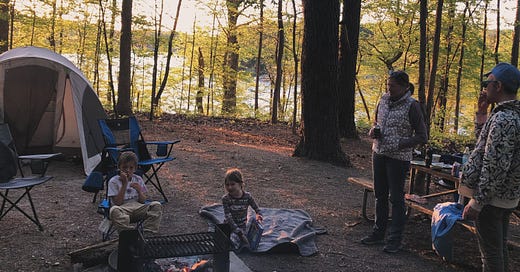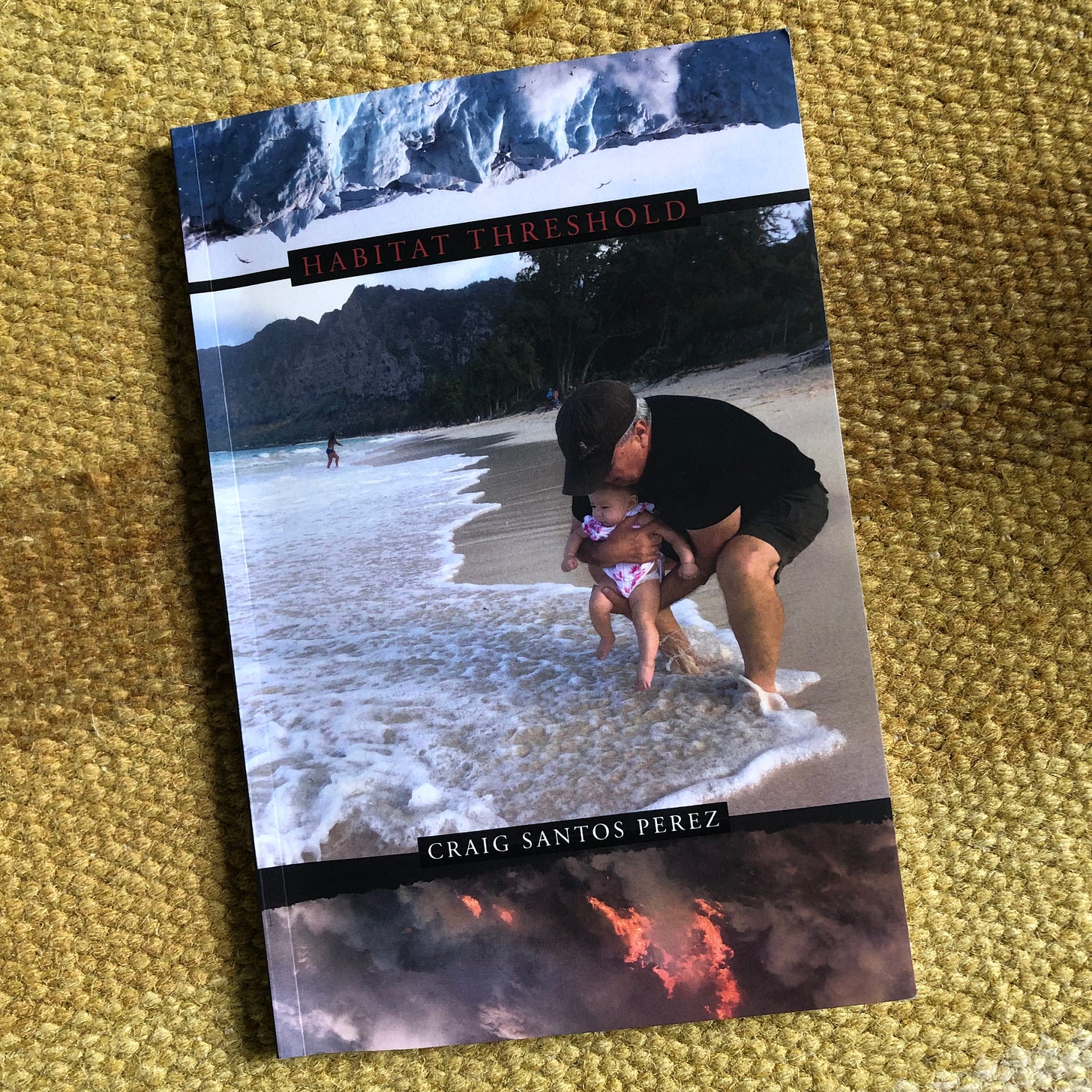I am writing to you today from between two journeys: Just back from a camping trip with friends to North Carolina’s Falls Lake — a regular spot for us the past few years — and preparing to head to New Orleans for their annual poetry festival where I’ll be presenting on a panel about “Poetry and the Afterlife.”
Everything tastes better when I’m living outside. And feels… MORE. We were battered by winds for hours. Hawks circled over our heads at sunset. The sun was raw, and we napped in the afternoons. Out there, my awareness returned again and again to Vanessa De Oliveira Andreotti’s distinction between meaningfulness and sense-fullness, where the latter is “experiencing ourselves as an extension of a plural, relatively unknowable, always intelligent, bio-intelligent world” (Hospicing Modernity).
Speaking of this plural and relatively unknowable world, do you read the poetry of Craig Santos Perez? I recently discovered his work when a poet friend recommended his collection Habitat Threshold to me. This book is an excellent example of poetry willing to “stay with the trouble,” a la Donna Haraway, and indeed it opens with an epigraph of an oft-quoted passage from her 2016 Staying With the Trouble: Making Kin in the Chthulucene:
Staying with the trouble requires learning to be truly present, not as a vanishing pivot between awful or edenic pasts and apocalyptic or salvific futures, but as mortal critters entwined in myriad unfinished configurations of places, times, matters, meanings.
How Perez’s poems do this is by refusing to look away from climate change and ecological destruction, including ocean pollution, mass extinction, plastics, and climate injustice/institutional racism, while also refusing to look away from love, care, and wonder. How, many of us have asked ourselves, can we acknowledge the magnitude of the predicament the world is in while also continuing to have and raise children? Perez answers with his poetry, such as the opening couplets of the poem, “Ring of Fire,” which read:
We host our daughter’s first birthday party
during the hottest April in history.
Outside, my dad grills meat over charcoal;
Inside, my mom steams rice and roasts
vegetables. They’ve traveled from California,
where drought carves trees into tinder… Thus celebration, community, and family exist always alongside the knowledge that things are not as they should be. The poem ends,
But tonight we sing, “Happy Birthday,” and blow
out the candles together. Smoke trembles
As if we all exhaled
the same flammable wish. I love that last image because it’s able to hold the complexity of our position as human beings on this planet at this moment, the love and hope, but also the “flammability” of our collective influence.
Perez’s book got me thinking about the layers of meaning in the word “threshold” the past few weeks. The original definition is, of course, the strip of wood or stone forming the bottom of a doorway and crossed as one enters a house or room, and the second related meaning is “a beginning.” Recently, though, I’ve heard the word used most often in one of its latter definitions in the context of climate change, “the magnitude or intensity that must be exceeded for a certain reaction, phenomenon, result, or condition to occur or be manifested” (Oxford Languages) such as the 1.5 C benchmark from the Paris Agreement (now past), and the various “tipping points” that, the UN warns, will significantly impair our ability to deal with the crisis.
So, when thinking about teaching this year’s summer poetry workshop, “Thresholds” seemed an apt title. This word which calls to mind a doorway, an opening, a beginning, seemed to me a kind of doorway itself, an opening into possibilities we might explore together.
I’d like to invite you Wilderment readers to join me in these possibilities.
Here is a brief description of the course, which will meet on Zoom:
In a world at the threshold, on the brink, in which it’s easy to feel overwhelmed with information, emotion, and anxiety, how can poetry be a place of opening, of receptivity, and flow between? In this five-week summer poetry workshop with Sarah Rose Nordgren, we will meet the bewildered world with both bravery and softness, equally prepared to accept and to transform.
This workshop includes weekly assigned course readings for inspiration and discussion, writing prompts, and group workshop feedback. The course is best suited to writers who have some previous workshop experience, but is open to poets of all levels. It will be capped at 12 participants, so space is limited.
Note: This course is scheduled for Mondays, July 15-Aug 12, 6-8:30pm ET (5-7:30 CT, 4-6:30 MT, 3-5:30 PT). You can register for a discounted tuition rate before June 1.
I hope some of you will join me in this between space—on this threshold—which is a place of both possibility and risk.







